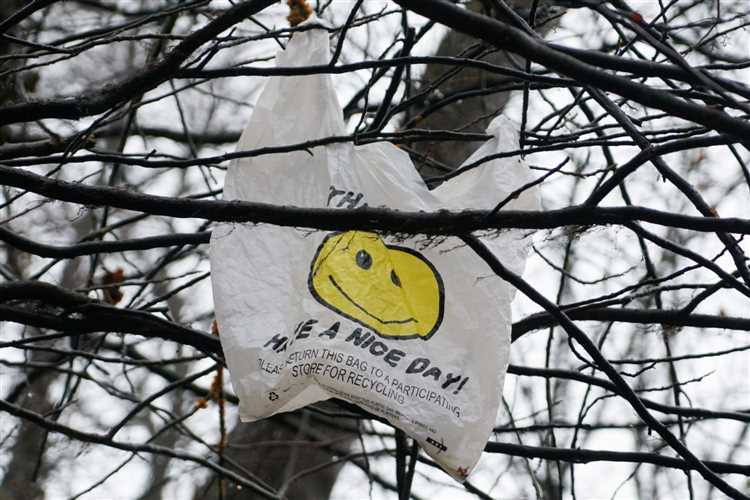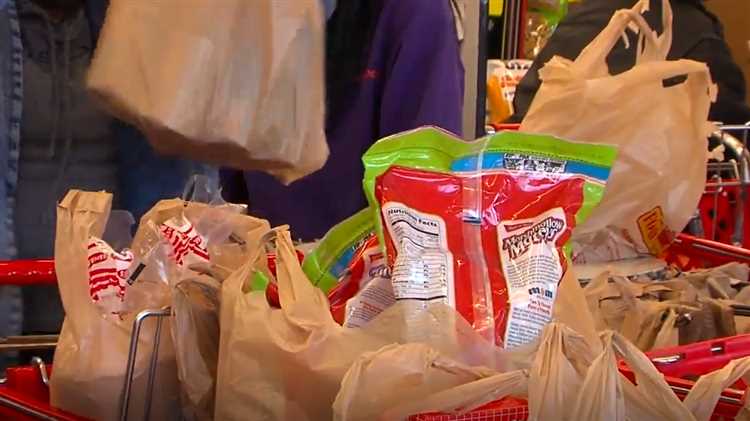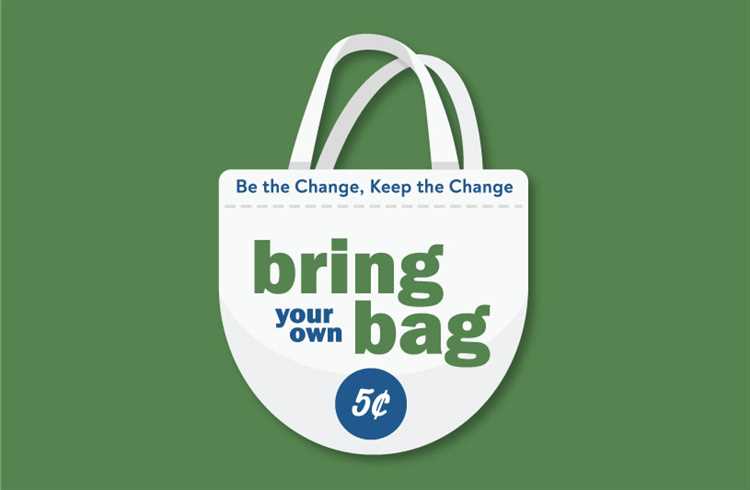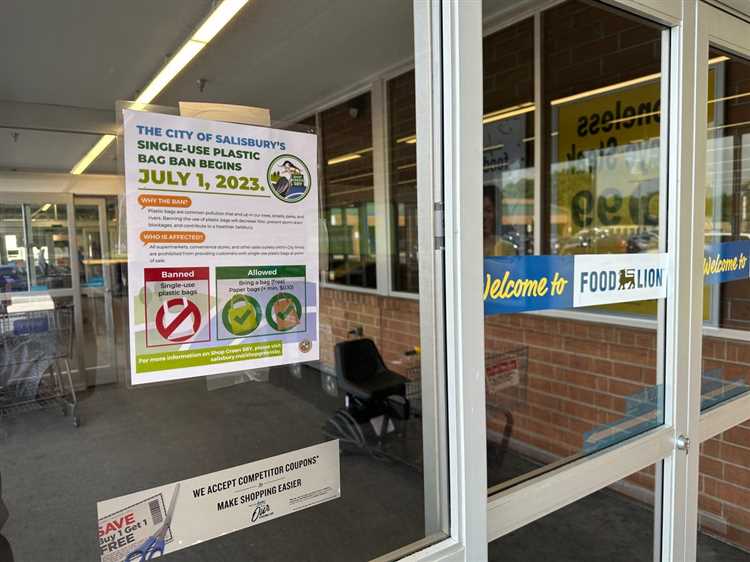
In recent years, the issue of single-use plastic bags has gained significant attention in the United States, with many states and cities implementing bag bans or fees in an effort to reduce plastic waste and promote sustainability. One state that has been at the forefront of this movement is Maryland.
Maryland is known for its beautiful natural landscapes, including the Chesapeake Bay and the Atlantic Ocean. However, these ecosystems are being threatened by the pollution caused by plastic bags.
Due to the environmental concerns and the need for action, Maryland became one of the first states to pass a bag ban in 2019. This means that certain types of single-use plastic bags are no longer allowed to be distributed by retailers in the state.
The aim of the bag ban is to reduce plastic waste and encourage consumers to use reusable bags instead. By eliminating single-use plastic bags, Maryland hopes to protect its natural resources and preserve the beauty of its landscapes for future generations.
- Frequently Asked Questions about Bag Bans in Maryland
- History of Bag Bans in Maryland
- Current Bag Ban Regulations in Maryland
- Environmental Impact of Bag Bans in Maryland
- Benefits and Drawbacks of Bag Bans in Maryland
- Benefits of Bag Bans
- Drawbacks of Bag Bans
- Compliance and Enforcement of Bag Bans in Maryland
- Future of Bag Bans in Maryland
- Benefits of a Statewide Bag Ban
- Obstacles and Opposition
- undefined
- Is there a bag ban in Maryland?
- When did the bag ban start in Maryland?
- What are the consequences for retailers if they don’t follow the bag ban?
- How much is the fee for paper or reusable bags in Maryland?
- Are there any exceptions to the bag ban in Maryland?
- Is there a ban on single-use plastic bags in Maryland?
Frequently Asked Questions about Bag Bans in Maryland
Q: Is there a bag ban in Maryland?
A: Yes, there is a bag ban in Maryland. The ban prohibits the distribution of single-use plastic bags by retailers at the point of sale.
Q: When did the bag ban go into effect?
A: The bag ban in Maryland went into effect on October 1, 2021.
Q: Are there any exceptions to the bag ban?
A: Yes, there are exceptions to the bag ban. For example, bags used for certain types of items such as raw meat, fish, or poultry are exempt from the ban.
Q: What are the alternatives to single-use plastic bags?
A: There are several alternatives to single-use plastic bags, including reusable bags made of cloth or other durable materials.
Q: What are the benefits of the bag ban?
A: The bag ban aims to reduce the use of single-use plastic bags, which are often not recycled and contribute to environmental pollution. By promoting the use of reusable bags, the ban helps to reduce waste and protect natural resources.
Q: What are the penalties for violating the bag ban?
A: The exact penalties for violating the bag ban may vary depending on the specific county or municipality. However, retailers found in violation of the ban may be subject to fines or other enforcement measures.
Q: How can I get involved in supporting the bag ban?
A: There are several ways to get involved in supporting the bag ban. You can start by using reusable bags when shopping and encouraging others to do the same. You can also support local organizations and initiatives that promote sustainable alternatives to single-use plastic bags.
Q: Are there any other states with bag bans?
A: Yes, several states across the United States have implemented bag bans or restrictions to reduce the use of single-use plastic bags. Some examples include California, New York, and Hawaii.
History of Bag Bans in Maryland
In recent years, Maryland has made significant strides in reducing single-use plastic bag waste through implementing bag ban legislation. The state recognized the environmental impact of plastic bags and decided to take action to protect its natural resources.
In 2019, the Maryland General Assembly passed a bill banning single-use plastic bags throughout the state. This legislative action was a response to the growing concern about the negative effects of plastic bags on the environment. The ban aimed to encourage consumers to switch to reusable bags and reduce plastic waste.
However, the ban faced some legal challenges and was temporarily put on hold. In 2020, the Court of Appeals ruled that the ban could not be implemented due to inconsistencies in the legislation. This decision caused further discussions and amendments to the bill.
Eventually, in 2021, the Maryland General Assembly successfully passed a revised bag ban bill. The new legislation, which addresses the previous concerns, was signed into law by the governor. This comprehensive ban prohibits the distribution of single-use plastic bags in most retail establishments across the state.
The ban also encourages retailers to charge a fee for paper bags, further promoting the use of reusable bags. This fee aims to offset the cost of providing alternative bags and further incentivize consumers to make sustainable choices.
Overall, the history of bag bans in Maryland highlights the state’s commitment to environmental conservation and reducing plastic waste. By implementing these bans, Maryland aims to protect its natural resources and create a more sustainable future.
Current Bag Ban Regulations in Maryland
In an effort to reduce plastic waste and protect the environment, Maryland has implemented bag ban regulations in certain areas of the state. These regulations aim to encourage the use of reusable bags and discourage the use of single-use plastic bags.
As of July 1, 2020, a ban on single-use plastic bags went into effect in most retail establishments throughout the state. This ban applies to grocery stores, convenience stores, and other retailers that are over 7,000 square feet in size or are part of a chain with three or more locations in the state.
Under the bag ban regulations, retailers are prohibited from providing customers with thin plastic bags that have a thickness of less than 4 mils. Instead, customers are encouraged to bring their own reusable bags or purchase paper bags for a small fee.
There are some exceptions to the bag ban regulations. Retailers are allowed to provide plastic bags for certain purposes, such as for packaging loose produce, meat, or other perishable items. Additionally, bags used for prescription medications, newspapers, and dry cleaning are also exempt from the ban.
It is important to note that bag ban regulations may vary in different counties and municipalities within Maryland. Some areas may have already implemented bag bans or have more strict regulations in place. It is recommended to check the specific regulations in your area before going shopping.
Overall, the bag ban regulations in Maryland are an important step towards reducing plastic waste and protecting the environment. By encouraging the use of reusable bags, the state is working towards a cleaner and more sustainable future.
Environmental Impact of Bag Bans in Maryland

With the implementation of bag bans in Maryland, there has been a significant reduction in the usage of disposable plastic bags. This has had a positive impact on the environment and has helped reduce the amount of plastic waste that ends up in landfills and pollutes our ecosystems.
Plastic bags are known for their long lifespan and resistance to natural decomposition. By eliminating their use, Maryland is taking a step towards reducing its carbon footprint and protecting its natural resources. This is particularly important considering the state’s proximity to delicate ecosystems such as the Chesapeake Bay.
The use of reusable bags has become more prevalent since the bag bans were introduced. These bags, often made from sustainable materials such as cotton or recycled plastic, not only help reduce plastic waste but also have a lower environmental impact throughout their lifecycle. They can be reused multiple times, reducing the need for production and the associated energy consumption and carbon emissions.
Furthermore, the decrease in plastic bag usage has also had a positive effect on wildlife. Many animals mistake plastic bags for food or get entangled in them, leading to injury or death. By reducing the number of plastic bags in circulation, Maryland is helping protect its native wildlife and their habitats.
However, it’s important to note that bag bans in Maryland are not without their challenges. Some argue that the use of paper bags as an alternative to plastic bags also comes with environmental drawbacks. The production of paper bags requires more water, energy, and resources compared to plastic bags. Therefore, the promotion of reusable bags should remain a priority.
In conclusion, the bag bans in Maryland have had a positive environmental impact by reducing plastic waste and promoting the use of reusable bags. While there are some challenges associated with alternative bag options, the overall benefits to the environment far outweigh the drawbacks. Maryland can serve as an example for other states considering implementing bag bans to protect the environment and preserve natural resources.
Benefits and Drawbacks of Bag Bans in Maryland
Bag bans have become an increasingly popular solution to the environmental problems caused by single-use plastic bags. Maryland is one of the states that has implemented bag bans in an effort to reduce plastic waste and promote the use of reusable alternatives. While there are certainly benefits to bag bans, it is important to consider the drawbacks as well.
Benefits of Bag Bans

1. Environmental Impact: One of the main benefits of bag bans is the reduction in plastic waste. Single-use plastic bags are a major contributor to pollution and litter, especially in waterways and natural habitats. By eliminating or significantly reducing their use, bag bans help protect the environment and preserve wildlife.
2. Promotes Reusable Alternatives: Bag bans encourage people to use reusable bags, such as cloth or canvas bags, which are more durable and eco-friendly. Reusable bags can be used multiple times, reducing the need for single-use plastics and ultimately reducing waste.
3. Cost Savings: Bag bans can also save consumers money. Many retailers now charge a fee for single-use plastic bags or offer discounts for using reusable bags. Over time, this can lead to significant cost savings for individuals and families.
Drawbacks of Bag Bans
1. Inconvenience: One of the main drawbacks of bag bans is the inconvenience they can cause. People may forget their reusable bags or find them too bulky to carry around. This can result in an uncomfortable shopping experience and potentially discourage some individuals from supporting bag bans.
2. Transition Period: Bag bans often require a transition period for consumers and retailers to adapt to the new regulations. During this time, there may be confusion and resistance, which can impact the effectiveness of the ban. It may take time for people to adjust to using reusable bags consistently.
3. Potential Job Loss: Another drawback of bag bans is the potential impact on jobs. The production and distribution of single-use plastic bags create employment opportunities in the industry. With bag bans, these jobs may be at risk, particularly in communities that heavily rely on plastic bag manufacturing.
While bag bans have their benefits, it is important to weigh them against the drawbacks to determine the overall effectiveness and feasibility of implementing such policies in Maryland. These considerations can guide policymakers in making informed decisions that prioritize both environmental conservation and socioeconomic factors.
Compliance and Enforcement of Bag Bans in Maryland
In Maryland, bag bans have been implemented in several cities and counties to reduce plastic waste and promote sustainability. These bag bans aim to discourage the use of single-use plastic bags and encourage consumers to adopt more environmentally friendly alternatives.
Compliance with bag bans in Maryland is generally enforced at the local level, with each jurisdiction responsible for implementing their own regulations. This means that the specifics of how bag bans are enforced may vary from one city or county to another.
One common method of enforcement is through education and outreach programs. Local governments often work with community organizations and retailers to raise awareness about the ban and provide information on alternative bag options. This approach seeks to promote voluntary compliance by informing consumers about the environmental impact of plastic bags and the benefits of using reusable bags.
In some jurisdictions, compliance with the bag ban is more strictly enforced through fines and penalties. Retailers found violating the ban may be subject to warnings, fines, or other enforcement actions, depending on the severity of the violation. These penalties are designed to ensure that retailers are actively discouraging the use of plastic bags and promoting the use of reusable alternatives.
Most bag bans in Maryland also include certain exemptions which allow the use of plastic bags for specific purposes. For example, bags used for packaging bulk items, prescription drugs, or certain types of food may be exempt from the ban. These exemptions are typically included to accommodate specific industry needs and ensure that there is no significant impact on businesses.
Overall, compliance with bag bans in Maryland is an ongoing process that involves community engagement, education, and enforcement. By working together, local jurisdictions and residents can strive to reduce plastic waste and create a more sustainable future for Maryland.
Future of Bag Bans in Maryland
As of 2021, there is no statewide ban on single-use plastic bags in Maryland. However, several counties and cities in the state have taken it upon themselves to implement their own bag bans in order to reduce plastic waste and promote sustainable practices. Montgomery County was the first jurisdiction in Maryland to enact a bag ban in 2012, and since then, other areas such as Prince George’s County and the city of Baltimore have followed suit.
While these localized bag bans have been successful in their respective areas, there is a growing movement in Maryland to implement a statewide ban. Advocates argue that a uniform statewide ban would create consistency and prevent confusion among consumers who travel between different jurisdictions. They also believe that it would have a greater impact on reducing plastic waste and protecting the environment.
Efforts to pass a statewide bag ban have gained momentum in recent years. In 2020, legislation was introduced in the Maryland General Assembly that would have prohibited the distribution of single-use plastic bags across the entire state. Although the bill did not pass, it sparked important discussions and raised awareness about the need for a comprehensive bag ban in Maryland.
Benefits of a Statewide Bag Ban

A statewide bag ban in Maryland would have several benefits. First and foremost, it would significantly reduce the amount of plastic waste that ends up in landfills, waterways, and natural habitats. By encouraging the use of reusable bags, the ban would promote sustainable consumer behavior and reduce the demand for single-use plastics.
In addition to the environmental benefits, a statewide bag ban would also promote economic growth. It would create opportunities for businesses that produce and sell reusable bags, as well as incentivize innovation in the development of eco-friendly alternatives to plastic bags. This, in turn, would boost job creation and stimulate the local economy.
Obstacles and Opposition
While there is strong support for a statewide bag ban in Maryland, there are also obstacles and opposition to overcome. Some argue that a ban would place an undue burden on consumers and businesses, particularly small retailers who rely on the affordability and convenience of plastic bags.
Another challenge is ensuring that alternative options to plastic bags are readily available and accessible to all consumers. This includes providing affordable and durable reusable bags, as well as accommodating individuals who may have specific needs or disabilities that require the use of plastic bags.
| County / City | Date of Bag Ban Implementation |
|---|---|
| Montgomery County | January 1, 2012 |
| Prince George’s County | January 1, 2021 |
| Baltimore City | July 9, 2018 |
Despite these challenges, the future of bag bans in Maryland looks promising. With increasing public awareness of the negative impacts of single-use plastics and growing support for sustainable practices, it is likely that more counties and cities will implement their own bag bans in the coming years. Ultimately, this momentum could lead to the passage of a statewide bag ban and further contribute to the ongoing efforts to create a greener and cleaner Maryland.
undefined
Is there a bag ban in Maryland?
Yes, there is a bag ban in Maryland. Since October 1, 2021, Maryland has banned single-use plastic bags, and retailers are required to charge a 10 cent fee for each paper or reusable bag provided to customers.
When did the bag ban start in Maryland?
The bag ban in Maryland started on October 1, 2021. From that date, single-use plastic bags are no longer allowed, and retailers must charge a fee for paper or reusable bags.
What are the consequences for retailers if they don’t follow the bag ban?
Retailers in Maryland face consequences if they don’t follow the bag ban. If a retailer is found to be providing single-use plastic bags or not charging the required fee for paper or reusable bags, they may be subject to fines or penalties determined by local authorities.
How much is the fee for paper or reusable bags in Maryland?
The fee for paper or reusable bags in Maryland is 10 cents per bag. Retailers are required to charge this fee for every bag they provide to customers as an alternative to single-use plastic bags.
Are there any exceptions to the bag ban in Maryland?
Yes, there are some exceptions to the bag ban in Maryland. The ban does not apply to certain types of bags, such as those used for carrying prescription drugs, newspapers, or packages of meat and seafood. Additionally, the ban does not apply to bags used by customers in-store for bagging their own groceries or to bags used for carrying prepared take-out food.
Is there a ban on single-use plastic bags in Maryland?
Yes, there is a ban on single-use plastic bags in Maryland. The ban went into effect on July 1, 2021.